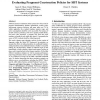Free Online Productivity Tools
i2Speak
i2Symbol
i2OCR
iTex2Img
iWeb2Print
iWeb2Shot
i2Type
iPdf2Split
iPdf2Merge
i2Bopomofo
i2Arabic
i2Style
i2Image
i2PDF
iLatex2Rtf
Sci2ools
VEE
2006
ACM
2006
ACM
Evaluating fragment construction policies for SDT systems
Software Dynamic Translation (SDT) systems have been used for program instrumentation, dynamic optimization, security policy enforcement, intrusion detection, and many other uses. To be widely applicable, the overhead (runtime, memory usage, and power consumption) should be as low as possible. For instance, if an SDT system is protecting a web server against possible attacks, but causes 30% slowdown, a company may need 30% more machines to handle the web traffic they expect. Consequently, the causes of SDT overhead should be studied rigorously. This work evaluates many alternative policies for the creation of fragments within the Strata SDT framework. In particular, we examine the effects of ending translation at conditional branches; ending translation at unconditional branches; whether to use partial inlining for call instructions; whether to build the target of calls immediately or lazily; whether to align branch targets; and how to place code to transition back to the dynamic tran...
Dynamic Translation | Dynamic Translator | Software Dynamic Translation | VEE 2006 | Virtualization |
| Added | 14 Jun 2010 |
| Updated | 14 Jun 2010 |
| Type | Conference |
| Year | 2006 |
| Where | VEE |
| Authors | Jason Hiser, Daniel Williams, Adrian Filipi, Jack W. Davidson, Bruce R. Childers |
Comments (0)

